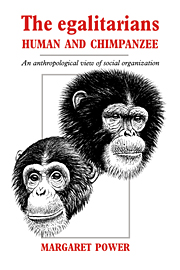Book contents
- Frontmatter
- Contents
- Foreword by A. Montagu
- Acknowledgments
- Part 1 Methods and prefatory explanations
- Part 2 The human foragers
- Part 3 The changing social order
- Part 4 The behavior of wild and provisioned groups: a theoretical analysis
- Part 5 The mutual dependence system
- Part 6 The egalitarian chimpanzees
- Part 7 Probabilities, possibilities and half-heard whispers
- Notes
- References
- Index
Part 3 - The changing social order
Published online by Cambridge University Press: 18 December 2009
- Frontmatter
- Contents
- Foreword by A. Montagu
- Acknowledgments
- Part 1 Methods and prefatory explanations
- Part 2 The human foragers
- Part 3 The changing social order
- Part 4 The behavior of wild and provisioned groups: a theoretical analysis
- Part 5 The mutual dependence system
- Part 6 The egalitarian chimpanzees
- Part 7 Probabilities, possibilities and half-heard whispers
- Notes
- References
- Index
Summary
In this section of the book the behavior and social organization of wild chimpanzees, as reported by those using naturalistic methods of field study, are compared with the same phenomena as they are reported among the Gombe and Mahale chimpanzees. The reader is warned that the way the evidence of negative social change is gathered together and presented here gives a very one-sided picture of the Gombe situation. Positive (friendly, supportive) interactions have not ceased. (They may even have increased as a result of the need for greater reassurance and consolation). There was not unremitting turmoil, but sporadic eruptions, with intervals of peaceful behavior. This comparison is begun by reference to an early insight of Kortlandt, as it structures the adapted egalitarian system of chimpanzees.
Kortlandt's hypothesis
Kortlandt's startling hypothesis is based on his 1960 observations of wild chimpanzee groups, made largely when they came to feed on pawpaw fruit growing on an abandoned edge of a plantation at Bossou, New Guinea. It was to his own very great surprise, Kortlandt (1962:132) comments, that he realized that ‘the chief social distinction’ in wild chimpanzee groups ‘is between childless and childrearing adults rather than between males and females.’ While this is an enormously important insight, it was met with a resounding silence by the academic community, presumably because this vital understanding does not fit within the then-unchallenged dominance paradigm.
Most of the early observers categorized chimpanzee groups into four types of subgroup, usually mixed groups (males, females and young) mother groups (females and young), all male, and lone male groups (Goodall 1965a; Reynolds and Reynolds 1965; Sugiyama 1972; Ghiglieri 1984).
- Type
- Chapter
- Information
- The Egalitarians - Human and ChimpanzeeAn Anthropological View of Social Organization, pp. 51 - 124Publisher: Cambridge University PressPrint publication year: 1991

